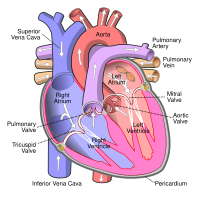
Comparison of Clinical Outcomes Among Patients With Atrial Fibrillation or Atrial Flutter Stratified by CHA2DS2-VASc Score
Sign Up to like & getrecommendations! Published in 2018 at "JAMA Network Open"
DOI: 10.1001/jamanetworkopen.2018.0941
Abstract: This cohort study uses Taiwan National Health Insurance database data to evaluate the incidence of ischemic stroke, hospitalization for heart failure, and all-cause mortality among patients with atrial fibrillation and atrial flutter stratified by CHA2DS2-VASc… read more here.
Keywords: atrial fibrillation; flutter stratified; among patients; fibrillation atrial ... See more keywords

Cost Conversations About Anticoagulation Between Patients With Atrial Fibrillation and Their Clinicians
Sign Up to like & getrecommendations! Published in 2021 at "JAMA Network Open"
DOI: 10.1001/jamanetworkopen.2021.16009
Abstract: Key Points Question What factors contribute to cost conversations about anticoagulation treatment between patients with atrial fibrillation and their clinicians, and what outcomes are associated with these conversations? Findings In this cohort study of 830… read more here.
Keywords: atrial fibrillation; conversations anticoagulation; cost conversations; patients atrial ... See more keywords

Effect of Mailing Educational Material to Patients With Atrial Fibrillation and Their Clinicians on Use of Oral Anticoagulants
Sign Up to like & getrecommendations! Published in 2022 at "JAMA Network Open"
DOI: 10.1001/jamanetworkopen.2022.14321
Abstract: Key Points Question Does a single educational mailing to a patient with atrial fibrillation and their clinician increase the use of oral anticoagulants for stroke prevention? Findings This randomized clinical trial found no statistically significant… read more here.
Keywords: patients atrial; effect mailing; fibrillation; use oral ... See more keywords

Outcomes and Safety of Very-Low-Dose Edoxaban in Frail Patients With Atrial Fibrillation in the ELDERCARE-AF Randomized Clinical Trial
Sign Up to like & getrecommendations! Published in 2022 at "JAMA Network Open"
DOI: 10.1001/jamanetworkopen.2022.28500
Abstract: Key Points Question Is very-low-dose edoxaban (15 mg/day) beneficial across frailty status among very elderly Japanese patients with atrial fibrillation considered ineligible for standard dose oral anticoagulants because of their high bleeding risk? Findings In… read more here.
Keywords: patients atrial; trial; dose edoxaban; atrial fibrillation ... See more keywords

Outcomes of Patients With Atrial Fibrillation Following Thrombectomy for Stroke
Sign Up to like & getrecommendations! Published in 2023 at "JAMA Network Open"
DOI: 10.1001/jamanetworkopen.2022.49993
Abstract: Key Points Question Do outcomes between patients with and without atrial fibrillation (AF) differ following mechanical thrombectomy (MT) for acute ischemic stroke (AIS)? Findings This systematic review and meta-analysis including 10 studies with 6543 found… read more here.
Keywords: outcomes patients; patients atrial; fibrillation following; atrial fibrillation ... See more keywords

Perioperative Acute Ischemic Stroke in Patients with Atrial Fibrillation.
Sign Up to like & getrecommendations! Published in 2023 at "Annals of neurology"
DOI: 10.1002/ana.26678
Abstract: OBJECTIVE Anticoagulation therapy is commonly interrupted in patients with atrial fibrillation (AF) for elective procedures. However, the risk factors of acute ischemic stroke (AIS) during the periprocedural period remain uncertain. We performed a nationwide analysis… read more here.
Keywords: patients atrial; acute ischemic; risk factors; risk ... See more keywords

A systematic review of randomized trials comparing double versus triple antithrombotic therapy in patients with atrial fibrillation undergoing percutaneous coronary intervention
Sign Up to like & getrecommendations! Published in 2019 at "Catheterization and Cardiovascular Interventions"
DOI: 10.1002/ccd.28535
Abstract: Prior randomized controlled trials (RCT) evaluating the optimal antithrombotic therapies for patients with atrial fibrillation (AF) undergoing percutaneous coronary intervention (PCI) have not been powered to evaluate ischemic outcomes. We compared double therapy with oral… read more here.
Keywords: atrial fibrillation; fibrillation undergoing; patients atrial; percutaneous coronary ... See more keywords

Efficacy and safety of apixaban vs warfarin in patients with atrial fibrillation and prior bioprosthetic valve replacement or valve repair: Insights from the ARISTOTLE trial
Sign Up to like & getrecommendations! Published in 2019 at "Clinical Cardiology"
DOI: 10.1002/clc.23178
Abstract: The optimal anticoagulation strategy for patients with atrial fibrillation (AF) and bioprosthetic valve (BPV) replacement or native valve repair remains uncertain. read more here.
Keywords: atrial fibrillation; replacement; valve repair; bioprosthetic valve ... See more keywords

Association of psychosocial factors with all‐cause hospitalizations in patients with atrial fibrillation
Sign Up to like & getrecommendations! Published in 2020 at "Clinical Cardiology"
DOI: 10.1002/clc.23503
Abstract: A high burden of cardiovascular comorbidities puts patients with atrial fibrillation (AF) at high risk for hospitalizations, but the role of other factors is less clear. read more here.
Keywords: atrial fibrillation; factors cause; psychosocial factors; association psychosocial ... See more keywords

Influence of rivaroxaban compared to vitamin K antagonist treatment upon development of cardiovascular calcification in patients with atrial fibrillation and/or pulmonary embolism
Sign Up to like & getrecommendations! Published in 2022 at "Clinical Cardiology"
DOI: 10.1002/clc.23819
Abstract: Vitamin K antagonists (VKA) such as warfarin or phenprocoumon have been the mainstay of therapy for long‐term oral anticoagulant therapy (OAT) in patients with atrial fibrillation or with pulmonary embolism. Due to interferences with matrix… read more here.
Keywords: patients atrial; calcification; pulmonary embolism; fibrillation pulmonary ... See more keywords

Comparison of efficacy and safety between VKAs and DOACs in patients with atrial fibrillation after transcatheter aortic valve replacement: A systematic review and meta‐analysis
Sign Up to like & getrecommendations! Published in 2022 at "Clinical Cardiology"
DOI: 10.1002/clc.23909
Abstract: In the past decade, direct oral anticoagulants (DOACs) have proven to be the best option for patients with nonvalvular atrial fibrillation. Nevertheless, evidence for the use of DOACs for anticoagulation in valvular atrial fibrillation, particularly… read more here.
Keywords: aortic valve; patients atrial; valve replacement; fibrillation ... See more keywords